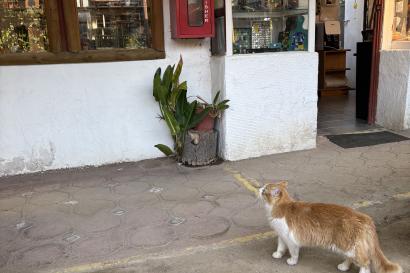“Ni shi nali ren?”
One of the questions I get asked most often after being asked if I can speak Chinese. As someone who was adopted from China, this is a complex and grayish area of my identity. Everyday interactions may suddenly turn into me divulging my whole backstory to random strangers with whom I am only having a casual interaction. I even looked up how to say “adopted” in Chinese, as it came up so much, as opposed to in the U.S. where I barely ever end up explaining the whole situation. When people ask how it feels to be visiting China, or in some cases, “returning to the homeland/motherland”, I often am not sure how to answer them. This being the first time I have been to China since being adopted, I feel like it is the same as if I were just another American tourist/student experiencing a new country, culture, and customs. However, I suppose there is another layer to the experience given my heritage.
I believe I have had a somewhat different experience in some regards compared to the rest of my American classmates. They get stares for being foreign-looking, I get stares for speaking English in public. People would often ask to take pictures with them (or simply do it without permission) whereas I could fly under the radar with no one bothering to take a second glance at me as I moved through a crowd. When I would sheepishly reply to a native speaker that I couldn’t understand what they had said, they would look confused and slightly disappointed after I explained I’m American. This was always accompanied with an unbidden feeling guilt and some embarrassment at not being as fluent as they expected, which I’m sure my classmates also experienced to some degree, however, it is a different kind when people have different expectations from the beginning.
Everywhere I went, whether it was the frisbee field, the store, it was expected I would be able to comprehend what was being communicated. If I was going to a restaurant or shop with a few classmates, the shopkeeper or waiter/waitress would often approach me first and start speaking in Chinese very quickly, naturally assuming I would be able to understand and was the guide/local connection/etc. accompanying the foreigners. Needless to say, they were surprised to find my blank expression and my companions’ subsequent use of Chinese. I was approached several times on the street by strangers asking for directions, or help of some kind, to whom I was only able to offer a self-conscious half-smile and “sorry, I don’t know” because I didn’t know the answer or, more often than not, didn’t understand what they were asking. A few times, my classmates mistook me for a stranger in crowded areas or couldn’t immediately find me.
Ron Wakabayashi, former director of the Japanese American Citizens League, once said “Asian Americans feel like we’re a guest in someone else’s house, that we can never really relax and put our feet up on the table.” He was referring to assimilation in the U.S., but I feel the same feeling applied to my situation while living in China. I never felt totally at ease in public settings, not knowing when someone might approach me or the like, expecting a native speaker/Chinese person. Even answering the question, “Are you Chinese?” posed a conundrum.
Occasionally, I would also feel like I needed to defend the customs or behavior of Chinese people. For example, if my classmates were complaining about the traffic and the disregard for others Chinese drivers seem to have, I felt compelled to speak up and explain it was just a cultural difference and they don’t mean anything by it. I don’t know why I felt the need to become the spokesperson on behalf of the Chinese people, but I did feel like I was the “token Chinese” person in those moments. When we went to Tongli water village and I wanted to dress in the traditional outfit for a souvenir photoshoot, part of me wondered if it would technically be appropriation since it would technically just be a Chinese person wearing old-style Chinese clothes. It has been interesting to live in a region that is so homogenous but where I now blend in, rather than stand out, for my Chinese appearance. I have wondered if I would have an even different perspective as someone who was an ABC (American-born Chinese), which is similar to my experience but holds key differences in several aspects.
Regardless of where I go, whether it be in the U.S. or China, I cannot escape the question “where are you from?” and have yet to find a satisfactory answer. Feeling inadequately Chinese in America and not-quite-American enough to meet expectations in China, the term “forever foreigner” seems pretty suitable in either case.

Keriann Reeves
Hi there! If you like cranberries, coffee, or swimming recreationally, you have come to the wrong place (but I'm sure there are blogs for those things elsewhere). I am currently a junior at the College of William and Mary and am studying Sociology and Marketing. I enjoy NPR tiny desk concerts and living vicariously through other people's Snapchats.
Also, I make some pretty decent Spotify playlists and am willing to make one for your next life event, whether it be a wedding, a party, or your dog's teeth cleaning. Join me as I journey through the bustling city of Shanghai and attempt to experience everything in 8 weeks!







